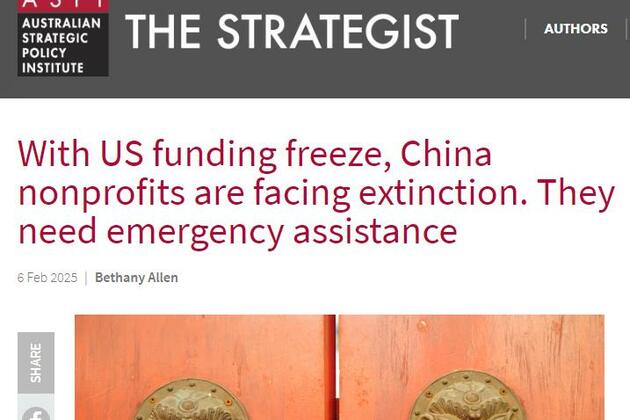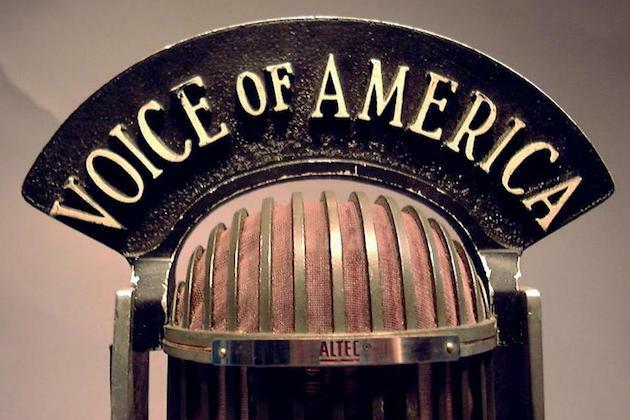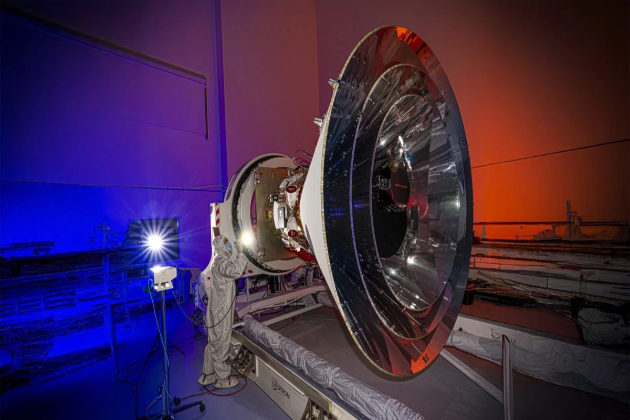Guest Opinion: ASPI's house of cards: How an anti-China smear machine imploded under its own lies
Xinhua
17 Mar 2025, 15:46 GMT+10

Screenshot of ASPI's profile page on social media platform X. (Xinhua)According to ASPI's 2020-2021 annual report, out of its total revenue of more than 10 million Australian dollars (6.3 million U.S. dollars), 18.3 percent came from overseas government agencies. The U.S. government emerged as the largest foreign donor, with most of its contributions explicitly earmarked for disinformation campaigns against China.by Xin PingAs the impact of the recent funding freeze of the U.S. Agency for International Development (USAID) is still playing out, now is time for the Australian Strategic Policy Institute (ASPI) to moan in agony.In early February, Bethany Allen, a key ASPI member, posted multiple "distress letters" on the institute's official website and her personal social media account, condemning the U.S. government's "funding freeze."Her remarks shattered the facade of ASPI as an "academic institution advocating for justice," exposing a long-standing pattern of "data manipulation" by Western media and think tanks, especially ASPI itself, in framing China-related issues.SUSPICIOUS DONOR NETWORKAllen lamented that the U.S. decision put NGOs and networks that had been feeding her with anti-China information in existential threats, with dozens of non-profits thrown into chaos and faced with suspensions, layoffs or closures.She was crying out loud for the NGOs, but what she did not mention was ASPI's own suspicious donor network under its self-claimed "independent, non-partisan" banner.According to ASPI's 2020-2021 annual report, out of its total revenue of more than 10 million Australian dollars (6.3 million U.S. dollars), 18.3 percent came from overseas government agencies. The U.S. government emerged as the largest foreign donor, with most of its contributions explicitly earmarked for disinformation campaigns against China: A grant of some 985,000 Australian dollars (623,562 dollars) funded ASPI's work to smear China on issues including Xinjiang, human rights, technology and global influence. Another grant of 590,000 Australian dollars (373,504 dollars) targeted China's talent programs, social media discourse and the technological sector. Combined, these two grants accounted for 80 percent of ASPI's foreign government funding.What kind of independence could one expect from an institute with such a donor network?Screenshot of an article by Bethany Allen, a key ASPI member, published on the organization's website. (Xinhua)PROPAGANDA MACHINE DISGUISED AS ACADEMIAASPI's mask of academic institute was already crumbling from within even before the USAID decision, and the abrupt funding withdrawal has only plunged the institute into a further systemic crisis.Its so-called in-depth reports and research on China are built on sand. A closer scrutiny would clearly show that under the guise of academic research, ASPI systematically manufactures falsehoods targeting China. Its most often used methodology -- presetting conclusions and cherry-picking evidence -- is anything but academic.In one of its reports on Xinjiang, vocational education and training centers are distorted as "reeducation camps," and retirement homes are falsely labeled as "detention centers."Another report maliciously lists 92 Chinese universities as "high-risk" institutions, warning Australian universities against collaborating with them. The list includes nearly all of China's top-tier STEM (science, technology, engineering and mathematics) and comprehensive universities, framing normal academic exchange as support for China's "human rights abuses."Even the Australian government noted something had to change. A government report released in December 2024 pointed to ASPI's misuse of funds, and recommended halting funding for ASPI's Washington D.C. office and subjecting national security research grants to competitive reviews every five years.The report revealed the think tank's true colors and effectively marked the end of ASPI's two-decade-long "privilege" to attack China.AMERICA'S STRATEGIC ENFORCERASPI's obsession with smearing China has led many to realize it is just a geopolitical tool or lackey of Washington. To quote the words of former Australian Foreign Minister Bob Carr, the institute has been pushing a "one-sided, pro-American view of the world."It has long portrayed China as Australia's "top strategic threat" and advocated decoupling from China. In the name of "maintaining the rules-based international order," ASPI is poisoning political and trade relations between the two countries, undermining mutual trust and understanding between the two peoples, and eroding a key foundation for the stability and prosperity in the Asia-Pacific region.Guess who benefits most from this?ASPI coordinated with the U.S. Congress to amplify anti-China narratives. Its false claims about Xinjiang's "reeducation camps," "forced labor" and "human rights abuses" provided ammunition for the passage of the so-called Uyghur Forced Labor Prevention Act by the U.S. Congress. U.S. lawmakers packaged ASPI's data as "independent think tank research" to legitimize sanctions on China. A propaganda chain was hence created, linking ASPI reports to U.S. media hype and then to congressional legislation.Cloaked in academic legitimacy, ASPI peddles ideological manipulation. Feasting on "anti-China dividends," it willingly serves as a hegemonic enforcer. Its goal is not to seek truth but to fracture trust and manufacture confrontation. Its reports are not scholarly outputs but loyalty pledges to its foreign donors.By stripping away ASPI's disguise, the world can now see clearly the shadowy hands hiding behind the veneer of a so-called "think tank."Editor's note: Xin Ping is a commentator on international affairs, writing regularly for Xinhua News Agency, Global Times, China Daily, CGTN, etc. He can be reached at [email protected] views expressed in this article are those of the author and do not necessarily reflect the positions of Xinhua News Agency.
 Share
Share
 Tweet
Tweet
 Share
Share
 Flip
Flip
 Email
Email
Watch latest videos
Subscribe and Follow
Get a daily dose of Central Asia Times news through our daily email, its complimentary and keeps you fully up to date with world and business news as well.
News RELEASES
Publish news of your business, community or sports group, personnel appointments, major event and more by submitting a news release to Central Asia Times.
More InformationInternational
SectionTrump administration pushes food firms to drop artificial dyes
NEW YORK CITY, New York: The Trump administration is pressuring major food companies to remove artificial dyes from their products,...
Lawmakers debate military expansion amid European security fears
BERLIN, Germany: German Lawmakers are debating whether to loosen the country's strict borrowing rules to fund military expansion. ...
Trump to end U.S. government international news services
The Voice of America may not live up to its ambitious name for much longer. Michael Abramowitz, the director of VOA, said in a Facebook...
Dozens dead as U.S. launches large scale offensive in Yemen
WASHINGTON, DC - U.S. President Donald Trump has joined Israel's war on Yemen's Houthis, days after the group said it would resume...
SPHEREx telescope to create a three-dimensional map of the cosmos
LOMPOC, California: NASA launched a new telescope into space this week to study the origins of the universe and search for hidden water...
Texas, New Mexico report 28 new measles cases in five days
AUSTIN/SANTA FE: Texas/New Mexico have reported 28 new measles cases in the past five days, bringing the total to 256 since the outbreak...
Asia
SectionJaguar Land Rover opts out of EV production at Tata’s India plant
NEW DELHI, India: Jaguar Land Rover (JLR) has decided against manufacturing electric vehicles at Tata Motors' upcoming $1 billion factory...
Virginia governor warns US must fast-track fusion or fall behind China
NEW YORK CITY, New York: The U.S. must accelerate its efforts to develop fusion energy or risk losing its edge to China, Virginia Governor...
China now dominates shipbuilding; US faces security risks
WASHINGTON, D.C.: In the past 20 years, China has become the world's top shipbuilder, producing more than half of all commercial ships....
China hits Canadian agriculture with tariffs in trade retaliation
BEIJING, China: China has announced new tariffs on Canadian agricultural and food products in retaliation for Canada's recent duties...
Guest Opinion: ASPI's house of cards: How an anti-China smear machine imploded under its own lies
Screenshot of ASPI's profile page on social media platform X. (Xinhua)According to ASPI's 2020-2021 annual report, out of its total...
'Khelo India Para Games 2025 huge opportunity for youngsters to grow,' says Navdeep Singh
New Delhi [India], March 17 (ANI): The 2024 Paralympics gold medal-winning javelin thrower Navdeep Singh believes the Khelo India Para...












